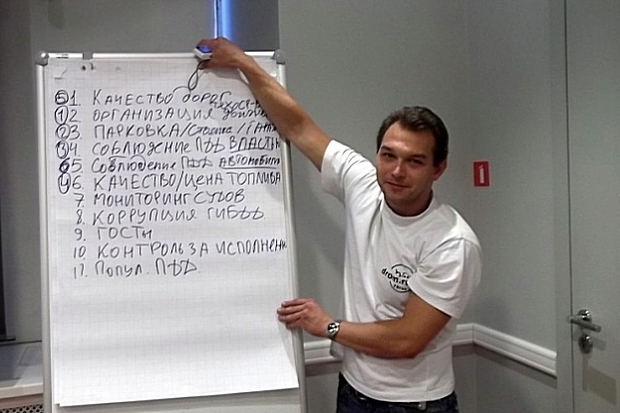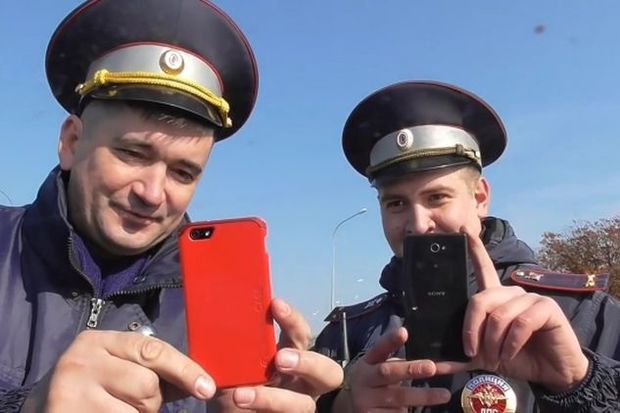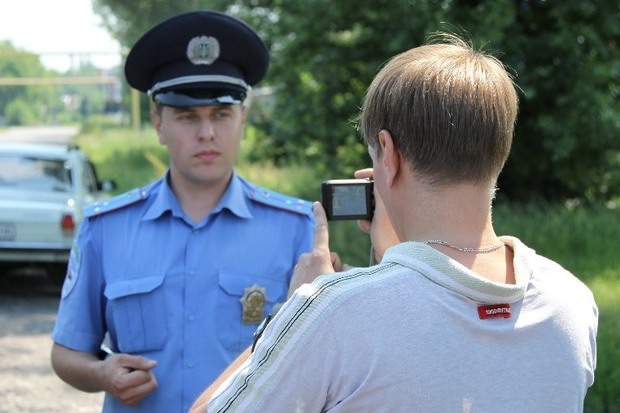Don't shoot, I'm embarassed: drivers to be banned photo and video recording of traffic cops
The norm that obliges traffic officers not to obstruct the use of recording equipment is removed from the new regulation of the road patrol police work
The Ministry of Internal Affairs is going to ban road users to conduct photo and video recording of their officers. This follows from the new administrative regulation prepared by the legal department of the Ministry of Internal Affairs. The document was publicly discussed from January 2017 and was amended. In particular, the important point concerning the obligation of the inspector not to obstruct the use of photo, video and audio recording equipment by a traffic participant was removed from the document. In that form it went to the Ministry of Justice and can be signed in the near future. The alarm was sounded by representatives of the Federation of automobile owners of Russia. According to them, the new regulation also has other amendments that significantly increase the powers of traffic officers and reduce the right of drivers. Read the details in the material of Realnoe Vremya.
Public debate not in favour of the public
The new regulation of traffic police work was to come into force in April 2017 but it was decided to slow down its adoption — from 31 January to 1 March, the document was publicly discussed on the federal portal of projects of normative-legal acts and an independent examination. The result was a revised document of the administrative regulation, from which it was removed the paragraph 10.13, which stated that ''the officers in the discharge of their duties shall not obstruct the use of photo, video and audio recording equipment by traffic participants if it is not prohibited by the law, in the presence of the prohibition they shall inform road users of its basis.'' In that revision the document went to the Ministry of Justice of Russia.
The alarm was sounded by the Federation of automobile owners of Russia, ''When I saw that this norm disappeared, I immediately wrote to the Ministry of Justice. Despite the fact that the public hearings were over but the story of 2009 shows that there is still a chance to get it back, because then the Ministry of Justice included the requirement of video recording. There is a chance that this time they will pay attention to it and ask the Ministry of Internal Affairs to return this rule,'' said Dmitry Klevtsov, Vice President of the Federation of motorists of Russia.

By the time of publication Realnoe Vremya failed to obtain an official statement of the traffic service. However, as it follows from the communication of Dmitry Klevtsov with representatives of the Interior Ministry of Russia, the provision protecting the rights of drivers disappeared from the document intentionally, not due to a technical error. He contacted them when he discovered the missing points in the new version of the administrative regulation.
''The developer, the representative of the legal department of the Ministry of Internal Affairs, explained it by the fact that there is no need to enter the provision separately because the regulation was written in 2009, when there was no law on police. In 2011, the law on police appeared, but there was no clear prohibition on obstructing the video recording. It says that when obstructing a recording teh officer must refer to the provisions of the law. Besides, they say, we have the federal law that citizens have the right to get and disseminate information by any legal way, it is the part 3 of the article 15 of the Constitution, which says that any prohibition must be published in the form of a regulatory act. But it is difficult to prove all this to a traffic officer. If to consider from the point of view of practice of the patrol and inspection service, which operates according to the law on the police, when problems arise and a citizen takes his phone, the officer forbids him. The citizen says that according to the law on police, you must refer to the normative document, which would prohibit the recording, on what he answers that ''you can appeal my actions in the high court,'' said Dmitry Klevtsov to Realnoe Vremya.
''I thought that protocols were intended for oppositionists, detained in rallies, but in fact…''
The absence of a norm obliging the traffic police officer not to obstruct a video recording will lead to abuses of power, believes Klevtsov. ''The officers will ban a video recording, thereby deprive the driver of an alternative source of evidence''. While inspectors of traffic police, according to the new regulation, have been left the right to ''use information systems, video and audio equipment, film and photo equipment, and other technical and special means which are not causing harm of life and health of citizens.''
''The police officers are entitled broad powers to substitute witnesses at administrative procedures with video recording with the help of special technical means or other means with video function. This statement means that if a police officer does not have a technical mean in the form of video recorder, pocket camcorder, then he can use private phone at administrative procedures. While personal means does not have a function of protection from erasure, and if for some reason this record is removed, then the citizen will not be able to prove his innocence,'' said Dmitry Klevtsov.

The attempts of the driver to record the communication with the traffic police officer on camera can lead to bad consequences — the officer can draw up a report for violation of the article 19.3 of the administrative code ''Disobedience to a lawful order of the official of the authority implementing state control (supervision) and municipal control.''
''We conducted judicial monitoring of the practice of application of this article, I thought that protocols were designed against oppositionists detained at rallies, but it turned out that most of the offenders are drivers. Almost all court decisions state that a driver was driving, he was stopped by a traffic officer. He began to use the camera, the officer forbid him to do it — here is the article 19.3. But this measure provides 15 days in jail. As a rule, such punishment is not given — 99% of these cases end with a fine at 500 rubles,'' said Klevtsov.
All the best to the guest: the right for recording will be left only to foreigners
The new regulation provides also other amendments that significantly increase the powers of officers and reduce the right of drivers. So, the requirement to store videos is envisaged only if a misdemeanor suspect is a foreign citizen, with the corresponding ''immunity''.
''So, does that mean that according to the letter of the law there is no requirement to carry out activities for the preservation of video recording against citizens of the Russian Federation?'' perplexed Klevtsov.
According to the representative of the Federation of automobile owners of Russia, the current regulation was good, it provided a lot of administrative procedures, starting with regulations of registration of road accidents and ending with the performance of the duty. ''It was enough that the police read it and knew not to violate the rights of citizens.'' Moreover, the rules of the regulation could be extended to other departments of the Ministry of Internal Affairs.

''For two years we have been writing letters to the Ministry of Internal Affairs with a request to introduce in the regulation the norms for conducting by citizens of photo and video recording in police departments, where access for the public is provided. It is clear that in the Armory the recording is forbidden, but there access for citizens is also prohibited,'' says Dmitry Klevtsov.
One must admit that the adoption of the new regulation will affect not only the rights of drivers, the Internet will also lose much. In social networks and YouTube there are hundreds of thousands funny and not very funny videos with communication of car owners with traffic police officers – it is the most popular content gaining millions of hits. It is only left to watch again and again the rich collection with nostalgia.